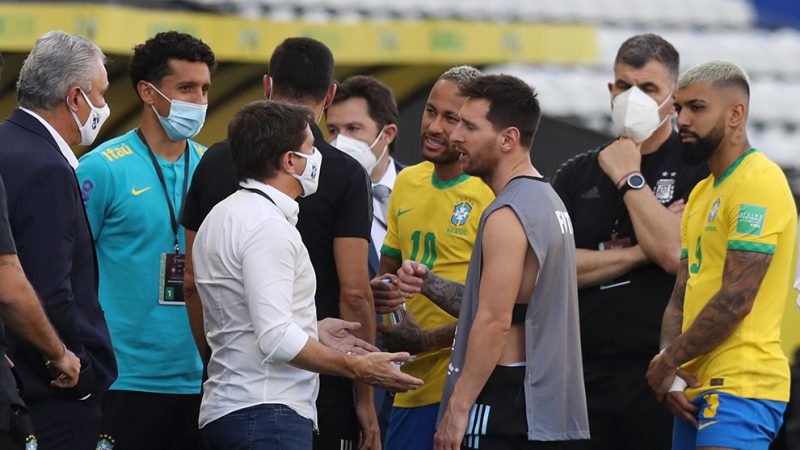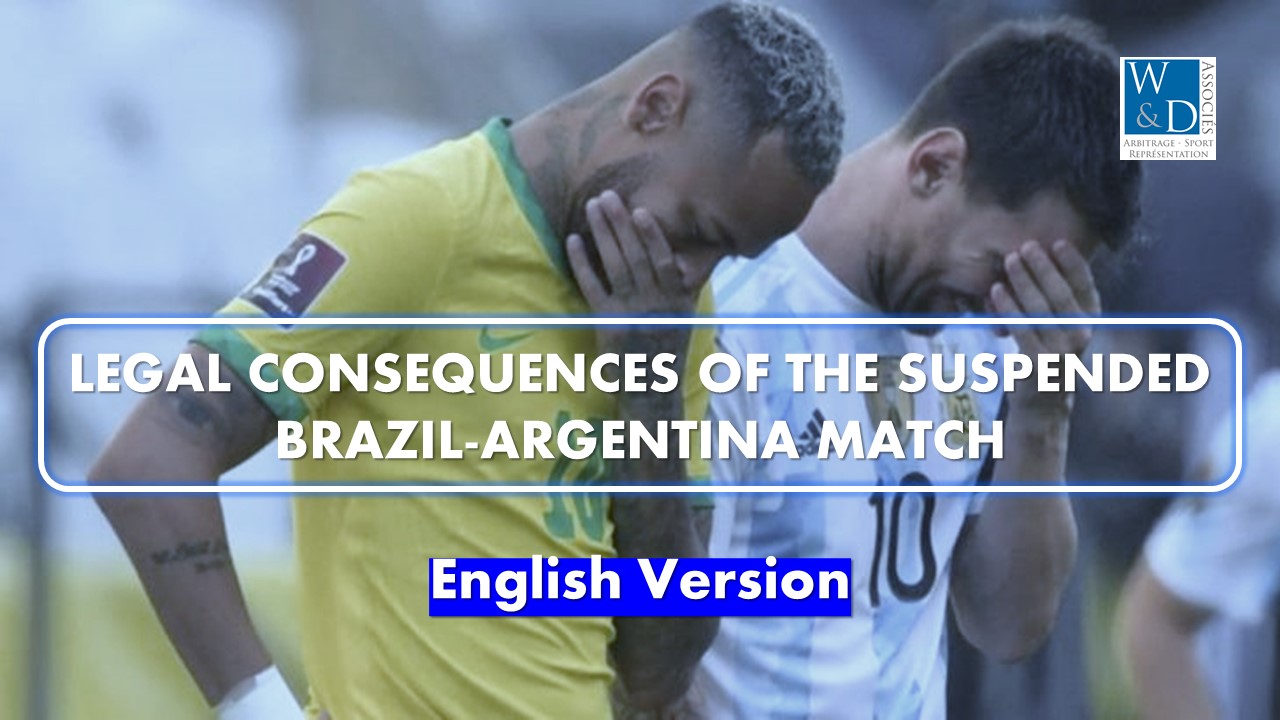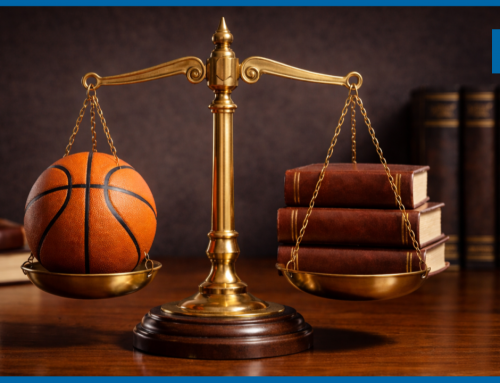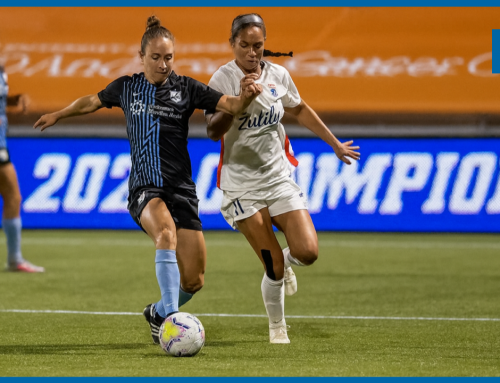Author: Blas Pugliese
Published by Winter – Dávila & Associés in Paris, on 07 september 2021
On 5 September last, we witnessed an extremely curious event, which was not appropriate in a sporting competition and in the context of a World Cup qualifying match between Brazil and Argentina in the city of Sao Paulo. Despite the confusing and contradictory information given by some protagonists, the truth was that a Brazilian administrative authority invaded the pitch in the middle of the match in order to cause the suspension of the competition, citing a health issue (for 4 passengers coming from the United Kingdom, which is forbidden by local legislation).
In order to contextualise the case, it should be considered that CONMEBOL drafted a “PROTOCOL OF OPERATIONS”, with a last version dated February 2021, resulting from the application to the CONMEBOL Qualifiers for the World Cup in Qatar 2022 organised by FIFA. That, from the text of the same protocol, it appears that it was designed for the resumption of CONMEBOL club competitions, already implemented in the CONMEBOL Libertadores and adapted for national team competitions.
That this plexus consists of 14 articles and 3 annexes in a body of 70 pages in which exhaustive rules regulating the conduct of all persons involved in the competition are prescribed. This was the result of the consensus of the 10 National Associations that make up the Confederation and in close collaboration with the National States both for its preparation and implementation.

Photo: marca.com
The Protocol’s implementation scheme is so rigorous that it requires delegations to have “a maximum of 60 persons who may only travel “on charter flights (private flights), as a sanitary bubble, i.e. without sharing the aircraft with other official delegations or with other persons outside the official delegation of up to 60 persons” (art. 1), It also prescribes that “For training, teams must follow all protocols, provisions and recommendations on hygiene measures and conduct of examinations of the Member Association and/or the health authorities of their country. It is recommended: Follow the recommendations of the Ministry of Health, Ministry of Labour, and other competent entities of the country. (art. 4).
In turn, the PROTOCOL provides for the designation of “a COVID-19 hygiene and good practices officer (“ad-hoc”) who will have the following functions:
Ensure that all persons working on the site implement and respect health and hygiene measures”. (art. 6) among many other things. In addition, the text provides for the prohibition that “members of the visiting delegation (both players and officials) leave the hotel and/or training grounds unless it is in previously agreed and organised conditions and does not involve coming into contact with anyone outside their delegation*” (art. 7). Various meetings were also envisaged for the purpose of dealing with what was termed “MATCH COORDINATION” and “MEETING AND SAFETY INSPECTION” including even representatives of the local public sector. (art. 9). Further on, the federative legislator wrote that “For the duration of the COVID-19 state of emergency, each host city shall form a Security Management Team (SMT), composed of the persons and/or entities listed below:
Local Team Security Officer.
– One (1) representative of the Local Police.
– One (1) representative of the private security and/or logistics.
– One (1) representative of the health operator (APS).
– One (1) representative of the stadium administration”. (art. 11), among many other provisions.
Even in various parts of the regulatory framework, reference is made to other preparatory and inspective actions 5 hours before the match is scheduled to start. In addition, the list of called-up players of the Argentinean Football Association was published on 23/08/2021, in which the 4 players and the federally registered clubs (in England) were listed, which generated during the previous days a profuse worldwide debate in relation to the restrictions and permissions of movement of players from the so-called FIFA date.
All this is relevant for the purposes of delving into the question of the timing, timeliness and merit of the action carried out by Brazilian public officials (ANVISA) while the match was taking place. It should be borne in mind that the Argentine delegation arrived in Brazil on 3 September at 8 a.m., i.e. 3 days before the match, since it is unlikely that there would be any legitimate justification for the interruption of the match, and that only on 5 September at 4 p.m. and in the 6th minute of the game did the Brazilian health authority (ANVISA) choose to take this measure by invading the field of play to stop the match and, it is presumed, proceed to deport 4 players.
Ergo, the action taken by the Brazilian administrative authority is manifestly untimely, unreasonable and unsportsmanlike, without considering its legality by virtue of the provisions of local Brazilian criminal and administrative legislation and its complementary applicability to the CONMEBOL protocol.
Now, the sports legal consequences are that FIFA will have to resolve the issue in accordance with the provisions of articles 4.4.b and 5.4 of the Regulations for the Qatar 2022 World Cup, but it is no less important to highlight that, by validating the intervention of a public authority in order to suspend a match and under the aforementioned conditions, it would create a dangerous precedent that could be used in the future by unfortunate minds with spurious and unsportsmanlike objectives.
For this reason, it would be difficult to consider force majeure to have been constituted and, consequently, the provisions of articles 14, 16 and following of the applicable code would be applicable.
If you liked this Sports Law topic, we invite you to share the article, comment on it and also to visit the rest of publications in the social networks and platforms of Winter – Dávila et Associés
Original language of the article: Spanish
About the author,

Blas Pugliese :
Lawyer graduated in Law from the University of Buenos Aires, (Argentina). He is a member of the Colegio Público de Abogados de la Capital Federal en Buenos Aires and of the Colegio de Abogados la Provincia de Buenos Aires.
He has a postgraduate degree in “Sport Management, Marketing and Society” from the University of Milano-Bicocca (Italy) and a postgraduate degree in “Diritto Sportivo e Guistizia Sportiva” from the University “Degli Studi di Milano” (Italy). He is also a founding partner of the law firm Ludus Law, based in Buenos Aires.
In addition, Blas is the director of the Institute of Sports Law in the Province of Buenos Aires and of the Revista de Derecho del Deporte at the Latin American legal publishing house Microjuris.com.
This article was published by Winter – Dávila & Associés, an international law firm based in Paris, in France, represented by lawyers specialized in sports law, corporate law, arbitration and representation.








Leave A Comment